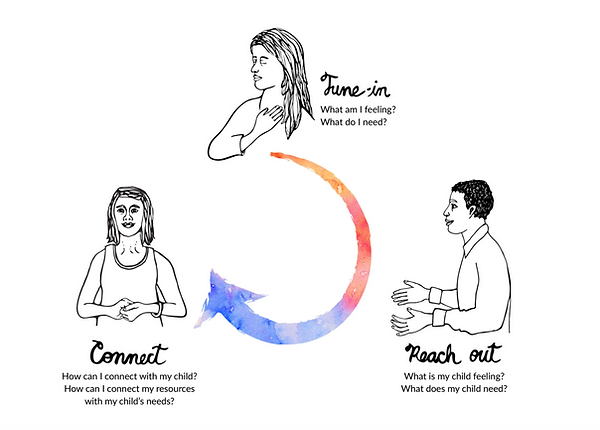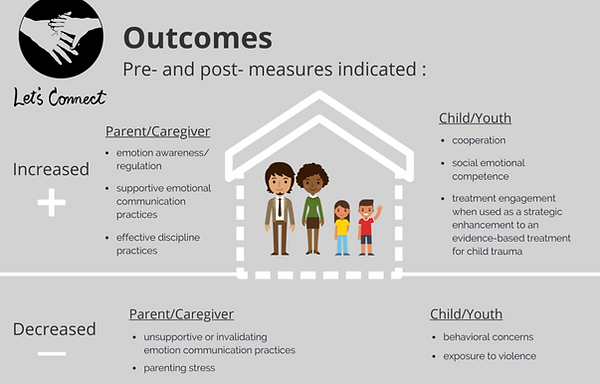Let's Connect
What is Let's Connect?
Let's Connect (LC) is a unique trauma-informed intervention strategy primarily designed for caregivers that is focused on identifying, understanding, and coping with their own emotions as well as helping their children do the same. The idea behind LC is that when caregivers understand and promote open communication about emotions and integrate coping strategies into the home, it cultivates warm and positive caregiver-child relationships, which in turn increase children's emotional competence, well-being, feelings of security, and resilience.¹ LC integrates live coaching by training facilitators to utilize role play to guide caregivers through implementing LC which builds community and supports caregivers through every step of the implementation process in their homes.² LC is informed by both developmental and clinical research and evidence-based practices that suggest that when caregivers are sensitive to children's emotions, it contributes to children's emotion regulation skills, health, and resilience.³ The single most important factor for a child's resilience is a stable, nurturing relationship with an adult, which is why LC uniquely uses caregiver well-being as a lever to improve child well-being.⁴ There are four main components to LC:
Education for Caregivers
First, caregivers are educated on factors of child resilience, what makes a stable family emotional dynamic, behavioral management strategies, and overall how children develop socially and emotionally. Education can be specifically tailored to the family's unique situation and include trauma-related topics.
Build Caregiver's Social and Emotional Skills
LC understands that caregiver well-being must be prioritized so they can build better relationships with their children. The program helps caregivers foster self-awareness, emotion regulation, and taking another's perspective, and provides training on becoming a supportive adult in the child's life. LC utilizes the Head to Heart Model to increase caregivers' intentional responses to their child (shown below).

Head-To-Heart Three Step Process for Caregivers - Graphic From http://www.letsconnect.org/components
Teach Caregivers Concrete Skills
Facilitators take an active role in teaching caregivers skills to interact with their child to support their child's social and emotional competence, improve child's behavior and mental health, and overall improve the nature of their relationship. To teach these skills, LC facilitators utilize the image of a house with foundation, walls, and roof.

House Model - Graphic From http://www.letsconnect.org/components
Home Environment
LC helps caregivers foster positive home environments that include routines and daily schedules in order to make home more consistent and predictable and to increase opportunities for the caregiver and child to connect.⁵
Through this process, LC's main goal is to help parents sit with their children's big and complex emotions without feeling like they need to have a perfect solution. Rather, it is important to open up space for children to express their feelings. LC aims to promote child resilience and well-being through parent resilience and well-being as well as through skills-based, hands-on training for everyday matters. The program uniquely integrates concerns of caregivers' wellbeing in a trauma-informed intervention, taking a holistic look at the child.⁶
Implementation/Cost
There are two main ways LC trains community facilitators: agency-based and open trainings.
Agency-based trainings are offered to Head Start or other ECE programs. The organization itself would reach out to LC and request training. LC trainers would then train members of the organization to work with families. These members do not need to be mental health professionals, but they are usually someone who works with families consistently such as family support specialists, but usually not teachers. The organization would be responsible for recruiting families for the program, but LC can help with language and flyers.
Open trainings are mainly attended by individual therapists with their own caseloads who want to learn more about this form of trauma-informed practice to apply to their clients.
In order to promote the sustainability of the intervention, LC trains members of organizations or mental health professionals to facilitate caregiver groups and/or individual interventions that teach and support caregivers in the implementation of the skills listed above. In this way, caregivers are working with someone they already have a relationship with, not an outsider, which allows for more open communication about topics that are relevant for the families, including trauma, divorce, incarceration, etc.⁷
Both caregivers and children participate in LC (either from an agency or individual therapist) and several methods are utilized, including direct instruction and open discussion, role play, live coaching as caregiver practices skills with their children, self-reflection, and caregiver wellness practices. These interventions can be used for both prevention and treatment, and usually are covered in 8-12 weekly sessions.⁸
Cost: Agency-based trainings, which include a total of 16 hours is $6000. LC can help agencies in the grant-writing process to help cover this fee. The agency can bring up to 25 people to the training (as more people are added, the cost increases). LC believes that training should never be provided without ongoing consultation and support. Therefore, the original training group is broken into smaller groups, often 12 and under, and have 12 ongoing consultation meetings about implementation over a period of 6 months for one hour each, costing an additional $2700 per consultation group. Open training is $550, which includes the training and 6 consultation meetings.
Design Process
LC was designed to fill several gaps in existing trauma-informed interventions for young children, as they borrowed aspects from known best-practices and added new skills. As LC creators observed children and their caregivers interact, they noticed that there was a gap in the focus on caregiver experiences in established interventions. Even if caregivers had the necessary skills to work with their child, if their emotional health wasn't being addressed, then they would have problems implementing similar skills with their children. Another gap was a lack of focus on the need to address a child's underlying emotional needs that might contribute to various behaviors. Although there were several interventions for children with PTSD, they didn't focus specifically on how to talk with children about big emotions, that are not always limited to trauma, in ongoing ways. Because of these gaps, LC was founded on these 2 core questions:
1. What are caregiver and child skills that contribute to resilience?
2. How can an intervention package and teach these skills in a way that is easy for parents and grounded in evidence-based principles?⁹
Evaluation
In 2017, the LC team piloted Let's Connect in a Jefferson County, Colorado Head Start, where they worked directly with families in the evenings while also including Head Start staff so they could implement it independently in the future. This evaluation was only used for internal purposes and not published because of the small sample size. LC offered Let's Connect in 2 formats: in a 7 week group workshop for caregivers and in an individual family format, both with and without trauma-focused individual treatment. Additionally, LC provided 3 half-day trainings for teachers and staff at Head Start so that they could knowledgeably refer families for the program in the future.
Parent experiences were evaluated using a pre- and post-test of 3 different instruments:
1. The Difficulties in Emotion Regulation Scale (DERS) - This instrument allowed caregivers to identify their own skill level
2. The Parenting Stress Index Short Form 4th Edition - This instrument measured parental stress across three dimensions.
3. The Devereux Early Childhood Assessment Preschool, 2nd Edition - This instrument asked parents to rate their child's strengths in self regulation, attachment and relationship skills, and behaviors.
During pre-test evaluations, the LC team found that caregivers who chose to participate in LC generally had lower levels of emotional awareness and coping and higher levels of stress than in comparative samples nationally, even within Head Start samples. Additionally, children of these caregivers had more behavioral concerns and less noted strengths than comparative samples.
After undergoing LC training, these Head Start families showed statistically significant gains in:
- caregivers' ability to understand their own emotions and feelings
- caregivers' ability to use regulation methods
- caregivers' ability to engage in goal-centered behaviors
- children's skills in expressing and coping with emotions
- children's skills in managing their behavior more appropriately
Along with a significant decrease in:
- caregivers' level of stress
Qualitative responses from parents highlighted how LC decreased social isolation, increased community building, and helped them build communication skills with their children.
Although these are just details on the evaluation and outcomes of LC in one Head Start environment, LC is used from ages 3-15, so more general outcomes based on large sample sizes and a wider range of ages can be found below.¹⁰
“The support we really started giving each other [the parents] was nice. It really helped me process and think and out some deep thought into what could I do to help [my child] – It helped me think more – I can’t fix the big thing [parent incarcerated], but what can I do that is something to show her ‘I hear you’” - Caregiver Participant

LC Outcomes -Graphic From http://www.letsconnect.org/research
Outcomes
² Meeting with Dr. Torres - Trainer and Consultant for LC
⁴ http://www.letsconnect.org/why
⁵ http://www.letsconnect.org/components
⁶ Meeting with Dr. Torres - Trainer and Consultant for LC
⁷ Meeting with Dr. Torres - Trainer and Consultant for LC
⁸ http://www.letsconnect.org/projects
⁹ Meeting with Dr. Torres - Trainer and Consultant for LC
¹⁰ Let’s Connect at Jefferson County Head Start Final Summary